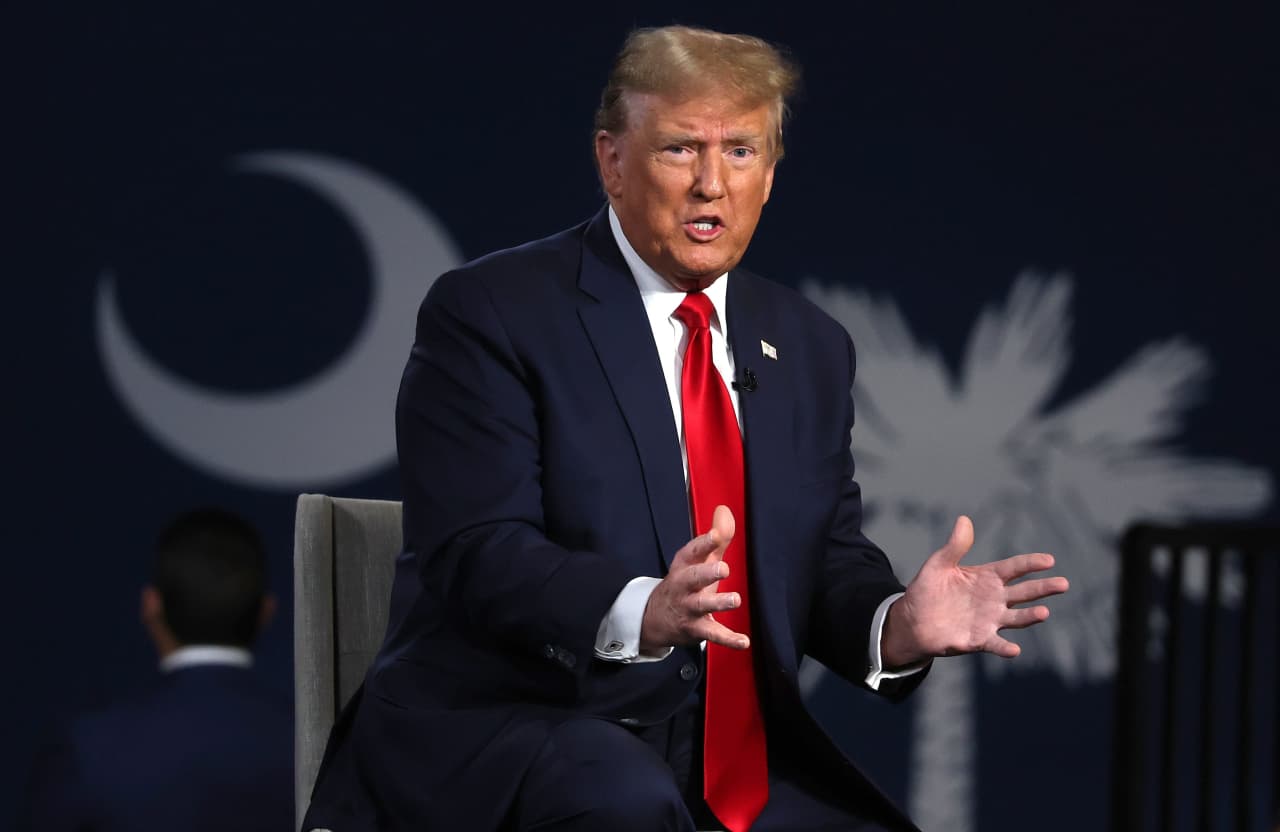[ad_1]
I have spent days trying to get a response out of Donald Trump, or one of his press officers, regarding a key issue about Social Security. In response, campaign spokesperson Steven Cheung sent me an email calling Nikki Haley a “moron” and a “birdbrain,” before directing me to a couple of internet links that didn’t answer the question. My other emails went unanswered.
Barring a major upset, Donald Trump is poised to become the Republican presidential nominee. And if the polls and betting markets are to be believed, he has the edge to win November’s election.
I don’t think the media’s two main approaches towards Trump — denial and hysteria — are helping anyone, least of all (a) the voters or (b) the media. But if there is an even chance that Trump will be elected president, and a 100% chance that Social Security will be hurtling very close to insolvency while he is in the White House, I think he ought to be answering some clear questions, clearly.
This is especially true as he bombarded Republican voters in South Carolina with commercials attacking Nikki Haley, his last remaining rival for the GOP nomination, on Social Security. His commercials implied that Haley would raise the retirement age by 10 years for people nearing retirement. No such proposal, nor anything like it, has been put forward by anyone in Washington I’ve ever heard of. I have seen nothing suggesting Haley has said or implied any such thing, nobody I know has, and she has adamantly denied it.
Surely, the voters have the right to know where Trump stands on this issue? The same is, of course, true of Joe Biden. But Biden has at least offered a proposal: levying a payroll tax on those making more than $400,000 a year. Also, I am not convinced he will actually be the Democrats’ nominee. (The betting markets give him about a 75% chance.)
The issue here is what Donald Trump means when he repeats the line that he will not “cut” Social Security. Actually, in the video on his website to which his campaign directed me, he is even more specific: “Under no circumstances should Republicans vote to cut a single penny from Medicare or Social Security to pay for Joe Biden’s reckless spending spree.” My italics.
It may sound like he is saying he will not make any changes to Social Security, and will not sign any bill that reduces expected future benefits. But that is not, technically, what he is saying. He is merely saying he will not “cut” benefits.
There is a big difference.
That’s because, under current law, the Social Security benefits planned for future retirees will be higher than those paid out currently to today’s retirees. The initial value of each cohort’s benefits rises in line with average wages in the economy.
But a future government could instead save a ton of money simply by scrapping those expected rises. Instead, they could just freeze benefits at current levels — raising them in line with consumer prices, but no more.
While that would mean a huge cut from their expected growth, you could plausibly argue that no benefits had actually been “cut.” They would simply stay the same.
This is not some far-out idea. It’s one that has been knocking around Washington for several decades. It’s something that Trump’s old friend, the late broadcaster Rush Limbaugh, used to talk about a lot. Limbaugh used to joke Washington was the only place where a raise was called a “cut” if it was just a smaller raise than you had expected.
This would have a huge effect on the Social Security budget. Romina Boccia, an analyst at the libertarian Cato Institute and an expert on the subject, describes it as “one of the most powerful changes Congress could adopt. It would almost entirely eliminate the unfunded liability.”
Even a halfway measure, which just slowed the growth of benefits for the top 70% of earners, could have a big effect. That alone would fill more than half the hole in the Social Security accounts, according to the Center for a Responsible Federal Budget, a centrist think tank focused on cutting deficits.
You can also make a logical argument for changing the Social Security formula. As Boccia points out, indexing benefits to wages didn’t even start until 1977.
But these savings come from somewhere: future retirees. Eugene Steuerle and Karen Smith at the Urban Institute, a liberal-leaning think tank, have the numbers. According to their calculations, under the current system, a married couple with two average incomes who turn 65 in 2060 would expect an initial Social Security benefit that’s about 50% bigger — in real, inflation-adjusted dollars — than the benefit of the same couple turning 65 today.
Right now, Donald Trump is vowing not to “cut” Social Security benefits. But he is also promising to extend his 2017 tax cuts and even add new ones. The numbers don’t add up. The federal government was already on track to mind-numbing levels of national debt. Something’s gotta give.
Freezing future Social Security benefits in real terms, in line with this policy idea, would be one way to address the problem — while still technically fulfilling his campaign promise not to “cut” benefits.
This is why I asked his campaign if he would categorically rule this out. So far they haven’t.
You would expect a “dealmaker” to be very careful about what he said and what he promised. I imagine Trump would take it as a compliment if I pointed out that anyone doing business with him should read the fine print — several times. He’s made much the same point himself, including in his books.
But this isn’t a new vodka venture. This isn’t a casino project. We have more at risk than some junk bonds. We shouldn’t have to be guessing. He’s the one running for president, not us. We await his reply.
[ad_2]
Source link

